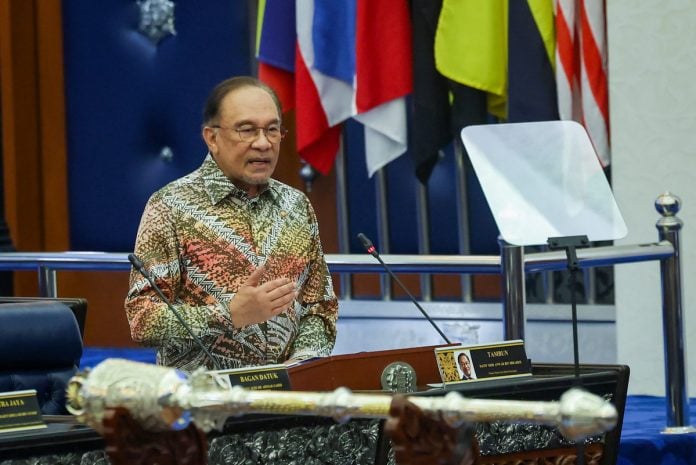KUALA LUMPUR: The following are the highlights of the 13th Malaysia Plan (13MP) 2026-2030, themed ‘Melakar Semua Pembangunan” (Redesigning Development), which was tabled by Prime Minister Datuk Seri Anwar Ibrahim in Parliament today.
US President Donald J. Trump has decided to review the tariff rates on Malaysia, with a decision expected by tomorrow at the latest.
President Trump has confirmed his attendance at the 47th ASEAN Summit in Kuala Lumpur in October.
13MP will focus on three key policy areas, namely:
i. Good Governance: The MADANI government continues its efforts to strengthen integrity and accountability, enhance the efficiency of public service delivery, and improve fiscal management.
ii. Streghthen overall economic resilience through value creation across all sectors.
iii. Inclusive and responsive development, with priority given to raising the quality and standard of living of the people.
• Gross Domestic Product (GDP) growth is targeted at between 4.5 per cent and 5.5 per cent annually, driven by domestic demand, particularly private consumption and investment.
• Investments totalling RM611 billion are required to ensure the success of the 13MP.
• The education sector will receive RM67 billion, while RM40 billion is allocated to the health sector.
• A total of RM51 billion has been allocated to the security sector, while the administration sector will receive RM17 billion.
• Governance improvements will focus on three key areas namely, institutionalising an efficient and effective government, delivering people-centred services, and ensuring fiscal strength while maximising the impact of national spending on target groups.
• The MADANI government is committed to strengthening the governance ecosystem through legal and institutional reforms, including in Parliament, as well as enhancing monitoring mechanisms and instilling values of integrity.
• Comprehensive reforms will be implemented through the enforcement of the Government Service • Efficiency Commitment Act 2025, with priority given to reducing regulatory burdens.
• MyDigital ID will be introduced as a secure and reliable single digital identity verification key to facilitate access to various online public services.
• Through GovTech, improvements will also be made to the country’s judicial system, including the Syariah Court.
• Civil servants will undergo intensive training in digital and artificial intelligence (AI) to strengthen the country’s digital talent pool and leverage big data analytics.
• Ninety-five per cent of Federal Government services are targeted to be delivered fully online by 2030.
• A focused approach and continuous efforts will be undertaken to ensure that Malaysia achieves a top 20 position in the Online Service Index (the UN E-Government Development Index) and maintains its Category A status in the GovTech Maturity Index.
• The MADANI Rakyat programme will continue to serve as a platform for leaders to go to the ground, engage with the people, and listen to their concerns.
• Engagement sessions between the Prime Minister and all state governments, irrespective of political affiliation, will continue.
• The competitive ecosystem will be strengthened through a new legal framework aimed at curbing rent-seeking activities.
• Fiscal reforms will continue to ensure that assistance reaches the most deserving groups.
• Malaysia aspires to become a high-income nation and rank among the world’s top 30 economies by 2030.
• Malaysia has outlined a clear direction to lead Southeast Asia’s economy in the fields of AI, digital technology, and renewable energy.
• Greater focus will be given to the application of local technological innovations to drive economic growth.
• Research, development, commercialisation and innovation (RDCI) activities will be intensified to enhance ‘Made by Malaysia’ products and services.
• The National AI Action Plan 2030 drives the development of local talent, research and technology commercialisation to support the widespread adoption of AI.
• The government aims to achieve 98 per cent 5G coverage in populated, industrial and rural areas by 2030 and produce at least 5,000 digital entrepreneurs.
• A National Digital Trust and Data Security Strategy will be launched to safeguard personal data, address cyber threats, and ensure the security of the national digital ecosystem and sovereignty.
• Priority will be given to the National Science, Technology and Innovation Policy, the Fourth Industrial Revolution (4IR) Policy, and the Malaysia Digital Economy Blueprint.
• The Business Digital Identity Recognition Initiative and digital twin technology have become key strategies to boost industry players’ competitiveness and innovation.
• The floating solar hybrid hydro initiative and green hydrogen hub in Kenyir will be expanded as an integrated green energy model, with the government also considering nuclear energy as a clean energy source.
• The construction of waste-to-energy plants will be expanded through collaboration with the private sector to reduce dependence on landfills.
• The Water Sector Transformation Plan 2040 will continue, with a focus on accelerating the development and innovation of efficient local water technologies.
• The country’s maritime legal framework will be reviewed and strengthened to ensure it remains relevant and competitive.
• Illegal, unreported and unregulated fishing activities will be eradicated, while the tagal system will be expanded as a sustainable fisheries practice.
• Focus will be given to the development of Special Tourism Investment Zones (STIZ), particularly in Johor, Melaka, Negeri Sembilan and Sarawak, as a catalyst for the creation of new tourism products.
• The homestay industry will be strengthened to expand economic spillovers to rural areas.
• Visit Malaysia Year 2026 will serve as a key catalyst in achieving the tourism sector’s target of contributing 16 per cent to GDP during the 13MP period.
• The government remains committed to driving the growth of the orange economy (creative industry), particularly through the high-potential digital creative sector, with the introduction of the Matching Fund and Joint Production Fund.
• Talent development will be strengthened through industry bridging programmes, expansion of the Train the Trainer initiative, and implementation of the Junior Animator Apprenticeship.
– Bernama








